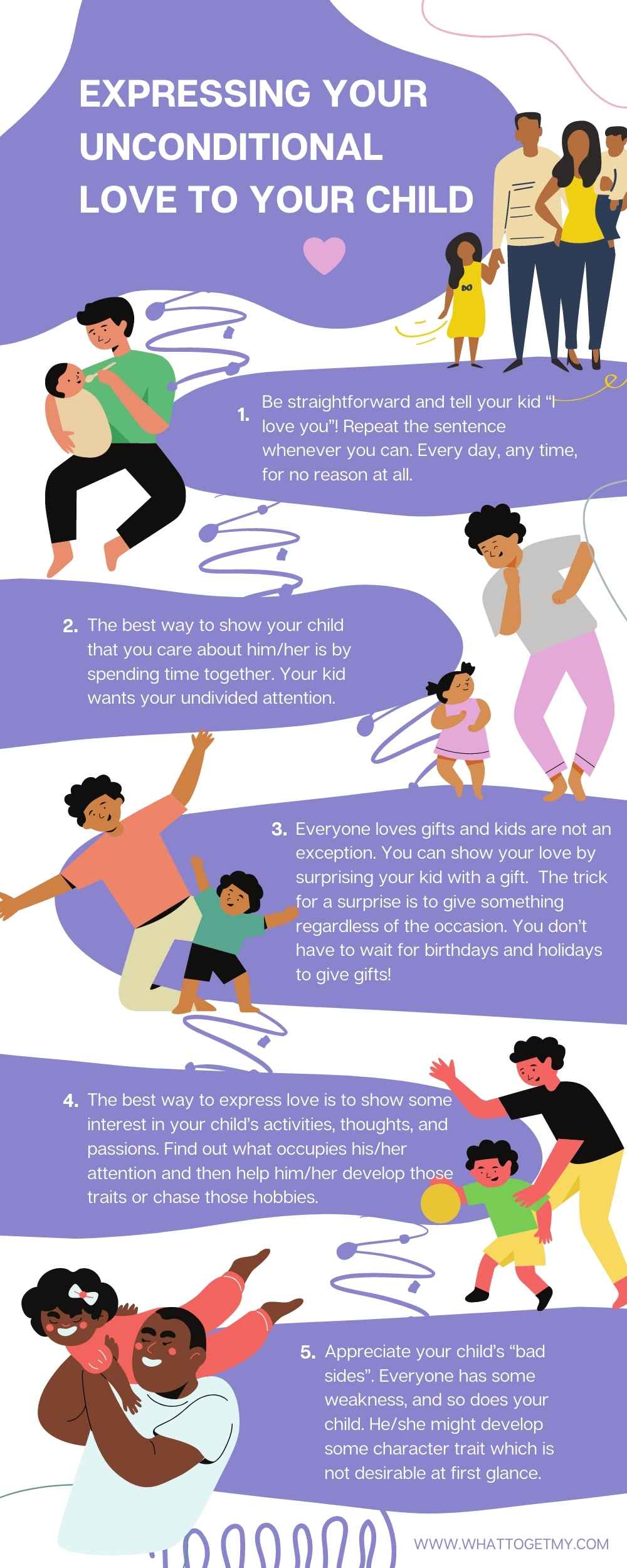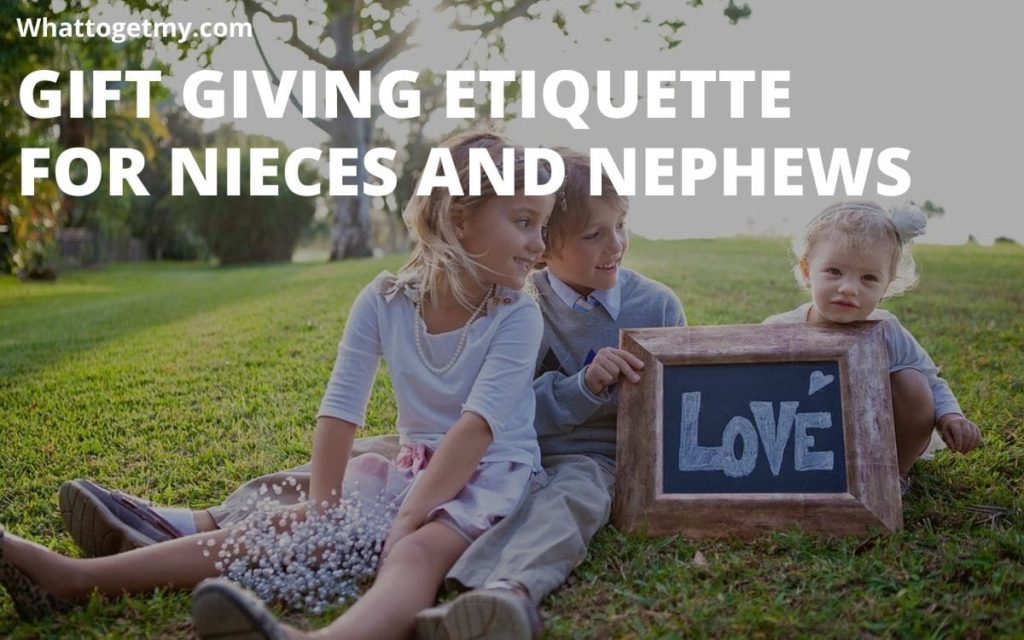How to Tell Your Child You Love Them Unconditionally
WhatToGetMy Instructional Article
Of course, you love your child without any conditions or reserve, like most parents. Maybe you have trouble expressing your love though? You don’t know how to tell your child you love them unconditionally. Don’t worry, that’s completely normal! It’s hard to express feelings, especially with a child, because children are more sensitive than adults. We’ll try to help you out with that by giving you a few thoughts and suggestions. You might change your approach, so your child feels more loved than ever before.
It’s important to think about these questions:
- What does unconditional love mean to you?
- How do you usually express love and other emotions?
- Are you sure your child understands the emotions he/she is going through?
- Did you explain to your child that there are different types of love in the world (between parents, siblings, parents and children, friends, etc.)?
- Does your child feel loved even if he/she makes mistakes?
- Does he/she come to you for help with a problem, or he/she tries to hide his/her mistakes because he/she fears your reactions?
If you only have vague answers to these questions, then you’re in the right place. In the article below, you’ll find various information about what unconditional love is, how can it be expressed, and why it’s important to share it. We’ll try to keep it short, so don’t stop scrolling if you want to find out more about the unconditional love between a parent and a child.
What is unconditional love?

Source Link: https://whattogetmy.com/how-to-tell-your-child-you-love-them-unconditionally/
This kind of feeling implies you love somebody without any condition or reserve. The child is loved just the way he/she is. You love your child, no matter what he/she does. If you need your child to love you back, that’s not unconditional love, because you shouldn’t expect something in return. Don’t think about loving somebody wholeheartedly and just feel it.
Parents might not be happy with their kids all the time. Still, unconditional love just means they find other ways of correcting unacceptable behavior. Some people don’t communicate disapproval with punishment. Raising a kid with unconditional love means that no fear exists in the relationship between a parent and a child. It’s best to always avoid punishments that only speak the message of fear and intimidation. They are the tool some people use to make their kid do what they want. Instead, a child should be left alone to do the right thing, on his/her own, without the fear of punishment. Unconditional love for a child will make him/her feel safe and accepted, so it’s more likely he/she won’t misbehave. A kid should only love and be loved, that’s all to it.
So how can you express unconditional love?
A lot of articles focus on things you shouldn’t do in child care. We’re trying a different approach, so we’re going to speak about what should you do. We know you want to learn how to love your child unconditionally, or how to express that love. There are hundreds of simple ways to show your kid you love him/her. We researched these ways, and now we’ll present to you the ones we found to be very promising.
1# Say it out loud!
Yes, be straightforward and tell your kid “I love you”! Repeat the sentence whenever you can. Every day, any time, for no reason at all. You can even make silly remarks about the amount of love you feel like “I love you a gazillion bazillion times” or ”I love you more than the universe”. It might seem awkward to you, but your kid will enjoy hearing these kinds of stuff. You’ll see how fast he/she will get used to getting words of affection from you. You’ll see his/her face light up with a big smile, and you’ll know you’re doing the right thing. You might even want to expand this straight-up expression of love and say what exactly you love about him/her. That can be his/her personality, characteristics, creativity, enthusiasm, etc. Show him/her you’ve noticed what makes him/her special!
Also, believe in your child, so he/she learns to stand on his/her own. When your child accomplishes something you should praise him/her no matter how big or small the achievement might be. A simple “Yaaay, you did it” is good enough. Some people don’t think it’s a good thing to compliment a child only after he/she succeed in something. We don’t agree! You should try to do it more often because it’s beneficial for your child’s development. For example, if he/she runs a race and loses, praise the effort anyway. You might even add something like “I loved watching you race”. That way, you’re not praising an outcome, but an activity. You’ve clearly stated that you are glad you invested your time to watch him/her race, even though he/she didn’t win. This sends a clear message you love him no matter what.
2# Spend quality time together
The best way to show your child that you care about him/her is by spending time together. Your kid wants your undivided attention. When you decide to spend time with your kid, focus and devote yourself to the activity. Leave your phone in the other room, forget about your work, and stay involved. There are many activities you can try with your kid: playing, cooking, reading, building something (a pillow fort for example), making arts and crafts, etc. If you have a pet, even better. There are a lot of fun things to do with your dog outside! Watching TV and cuddling on the couch can also be a cherished activity. Of course, you should try to spend as much time as you can with him/her, but if you have a busy schedule, 15 minutes a day is enough. That’s 15 minutes of undivided attention! You need to let your child know he/she is worth your time.
3# Gift-giving
Everyone loves gifts and kids are not an exception. You can show your love by surprising your kid with a gift. The trick for a surprise is to give something regardless of the occasion. You don’t have to wait for birthdays and holidays to give gifts! There are a lot of ways to surprise someone with a gift, so don’t hesitate to try.
You don’t have to buy something expensive for your kid. A small but thoughtful gift might even be better than some amazing pricey toy. For example, a gift basket is just perfect for this purpose. You can make a good gift basket and put some cute little notes in it. We’re sure it will be greatly appreciated!
Another superb idea is to give your kid one of your valuable possessions as an unexpected gift. Something that’s been in your family for generations will surely be an amazing gift. It will help you share the love with your kid.
4# Get to know your child better
The best way to express love is to show some interest in your child’s activities, thoughts, and passions. Find out what occupies his/her attention and then help him/her develop those traits or chase those hobbies. You might even find out things that will surprise you! Maybe he/she likes to explore or has mature thoughts. Make clear to your child that she/he can try any sports or pursue any activity he/she likes. Encourage your child and make sure he/she knows that you won’t be disappointed, no matter what.
5# Put a positive spin on your child’s traits
Appreciate your child’s “bad sides”. Everyone has some weakness, and so does your child. He/she might develop some character trait which is not desirable at first glance. For example, your kid might be very stubborn.That can be manifested through constant fighting with you or your partner. However, that can be transformed into an advantage for goal achievement. This kind of persistence might do your child good if he/she becomes a lawyer, a scientist, etc. Your role in this situation is to help your kid turn his/her weakness into a strength. He/she needs to learn to control himself/herself, and not drive other people crazy. Teach your kid boundaries. Self-management is hard to learn, and it’s your job, as a parent, to give your best so your kid can understand this.
6# Celebrate the big moments
Remember to cherish and celebrate “big” moments in your kid’s life like birthdays, the first day of school, acting in a play, etc. If your kid puts a lot of effort into learning the lines for the play, make sure to praise it. Make a big deal out of the play. Invite relatives and friends to support your kid. He/she might have a bit of stage fright, but will surely overcome it. If you put your heart into supporting him/her, your child will feel the love. It shouldn’t matter to you whether your kid was good enough in that play or not. The most important thing is to be there and to give your love and support. Children only want to see their dads and moms in the audience. The same thing applies to any other special occasion.
7# Teach them all you know
You can’t expect your kid to learn and grow as a person if you don’t put the time into teaching him/her. From spiritual values to the simple physical tasks, you should share your knowledge with your kid. You can teach him/her how to ride a bike, drive a car, fix a flat tire and that can be a bonding activity. There are so many things you can pass on.
Even if you don’t share the lessons verbally, the kid learns while watching you do stuff. You are the mirror your kid reflects to. Be careful with your behavior around your child. He/she is a sponge and will repeat your actions. So if you show love, he/she will catch it.
How to love unconditionally when your child is being difficult
We know what you are thinking, how can you share the love if your child is acting terrible. Life is made of difficult moments. And hard times are the period when unconditional love for a child is needed the most. It’s easy to love unconditionally when the kid is being good. However, figuring out how to love him/her while he/she is being difficult is another thing. If your child misbehaves, even if he/she does something tremendous, you need to remain calm. Manage your anger and don’t ever “lash out” on a child. If you punish your child, shout or threaten to hurt him/her, you are doing irreparable damage to your relationship. Your kid only feels you are intentionally causing him/her pain, and might not even know why. If you haven’t set clear boundaries and expectations, how can he/she know how to behave? If you can’t explain to your child, through calm conversation, what he/she did wrong, how can he/she learn and make amends?
Withdrawing your love because your kid made a mistake means you don’t love him unconditionally. Stop for a second and really think about this. Is your love a reward for your child’s nice behavior? Or do you love your child no matter what? You know that punishment isn’t the right thing to do, so when your kid messes up you need to stop and breathe. Your kid might ask you what’s happening and you can show him how to properly react in stressful situations. Lead by example and teach your kid how to calm down. Say to him that you love him/her, even though he did something bad. We know that’s a hard thing to do, but it is necessary. Your kid will feel the difference between this “I love you” and the one you give him in the moments of joy. It’s important that you tell those words and mean it. Remind him that your love is unconditional and that will help him improve his/her behavior. Hug or kiss him/her for example. Only after the “cool off” period you should talk about what has happened.
A lot of people judge those “talks” with kids. They think some kids might be too young to understand complex concepts. Well, don’t speak about complicated stuff. Explain to your kid in simple terms what was wrong and what you expect from him/her. Punishments can’t be comprehended the way some parents want. Instead, they cause fear and resentment towards parents and the kid internalizes negative emotions. If the child can’t understand a discussion about wrong and right, as some people suggest, he/she can’t understand the purpose of punishment either. We think that kids, no matter how young, respond well to simple talks. Your kid is not going to be perfect, but if he/she knows you support him/her, the change for the better is easier. Teach him how to make amends. For example, ask him/her to apologize and hug his/her siblings after hitting them. Your child needs to learn that actions have consequences. She will understand it if you stay firm in your discipline measures, but warm in showing affection.
Conclusion
By now, you’ve probably figured out why it’s important to love your children unconditionally. Without unconditional love, children might internalize fear of failure, because they only felt loved when they succeed in something or when they behaved well. If parents only show love when kids are “good” and withdraw affection when they are “bad”, they will grow to resent their parents. The rejection of their parents might eventually cause low self-esteem, trust issues, insecurities, etc. The children who don’t know they are loved usually become adults that don’t take risks, explore the world etc. They might even become blocked by fear of making mistakes. The fear of failure is the reason why most kids start lying to their parents. They just don’t want to disappoint them. We hope that won’t happen to you and your kid because now you know how to tell your child you love them unconditionally, and he/she can grow to be a strong and confident adult.
01 HOUR 21 MINUTES
ESTIMATED TIME DESIGNING AND UPLOADING THIS ARTICLE
06 HOURS 30 MINUTES
ESTIMATED TIME RESEARCHING AND WRITING THIS ARTICLE
You Might Also Like

12 Super Fun Activities for 12 Year Olds at Home
12 Super Fun Activities for 12 Year Olds At Home WhatToGetMy Instructional Article Coming up with all those new ideas when your children are bored is exhausting. You’re supposed to think of new ways to motivate and stimulate their little brains when your own is

What to Do If Your Child is Addicted to Video Games
What to Do If Your Child is Addicted to Video Games WhatToGetMy Instructional Article First you will need to identify significant behavioral changes in your child resulting from video game content. Then you will have to monitor the amount of time your child is putting

5 tips when deciding on room ideas for newborn child
5 tips when deciding on room ideas for newborn child WhatToGetMy Instructional Article You won’t find pictorial samples of baby rooms in this article because there are tons of them online. However, you’ll find 5 valuable tips that will inform your choice while skimming through

What to do with a newborn during summer: 11 Fun Activities
What to do with a newborn during summer: 11 Fun Activities WhatToGetMy Instructional Article Many new moms miss out on the possibility of having a fun-filled summer because of their little one. They just don’t know what to do with a newborn during summer. This

Unique Soccer Gifts for Children
If you have a young soccer fan in your family, you probably want to give him or her a themed gift. Most parents and family members opt for soccer balls, which is a great gift, but you might want to be cooler than that. Kids

A GIFT BASKET FOR YOUR SICK CHILD
A GIFT BASKET FOR YOUR SICK CHILD WhatToGetMy Instructional Article If you have a sick child, you know it can be difficult for both you and your child because nothing breaks your heart more than to see your child feeling utterly miserable and all you



